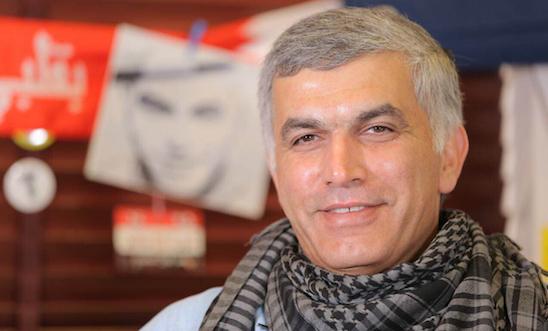After 455 days of arbitrary detention, the Bahraini government has again postponed the trial of leading human rights defender and president of the Bahrain Center for Human Rights (BCHR) Nabeel Rajab. Arrested on 13 June 2016, Rajab was sentenced to two years in prison in a separate case in July 2017, and is now facing up to another 15 years on charges related solely to comments he made on social media.
The current case against Rajab stems from tweets and even retweets posted to his Twitter account in recent years. He stands accused of spreading “false or malicious news, statements, or rumours”, “offending a foreign country [Saudi Arabia]”, and “offending a statutory body” because of his criticism of the Saudi-led military campaign in Yemen and the prevalence of torture in Bahrain’s prisons. If convicted on all counts, he could receive 15 years in prison – adding to the two-year sentence he received in July 2017 over similar charges connected to interviews he gave to the media in which he discussed the kingdom’s restrictions on free press. The authorities have also threatened to prosecute Rajab over editorials published in the New York Times and Le Monde newspapers.
Rajab has spent much of his ongoing detention period in solitary confinement and in unhygienic conditions. This treatment has led to a significant deterioration of his health resulting in repeated hospitalization – a concern raised by Americans for Democracy & Human Rights in Bahrain (ADHRB) before the United Nations Human Rights Council in May.
Bahraini authorities have repeatedly targeted Rajab over his human rights work. In December 2011, for example, after multiple postponements, he received a two-year prison sentence for involvement in peaceful demonstrations. Following the 2011 sentence, the Bahraini authorities again arrested Rajab in April 2015. The Bahraini government arrested Rajab for the charges related to tweets and retweets described above, for which he was pardoned months later. Following the pardons, the Bahraini government implemented a travel ban on him, which lasted until his re-arrest in June 2016.
Although Bahrain is acceded to the International Covenant on Civil and Political Rights (ICCPR), the government continues to contravene Article 19.2, which prohibits the criminalization of expression. Bahrain has the highest per capita prison population in the Middle East, and it is estimated that thousands of political prisoners or prisoners of conscience are incarcerated. ADHRB strongly urges the Government of Bahrain to immediately release Nabeel Rajab and all other detainees held for exercising their right to free expression, as well as to lift all undue constraints on fundamental freedoms in the kingdom.





